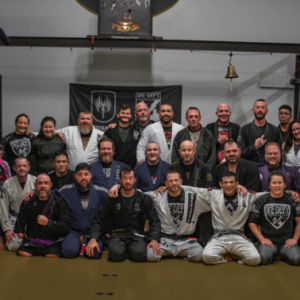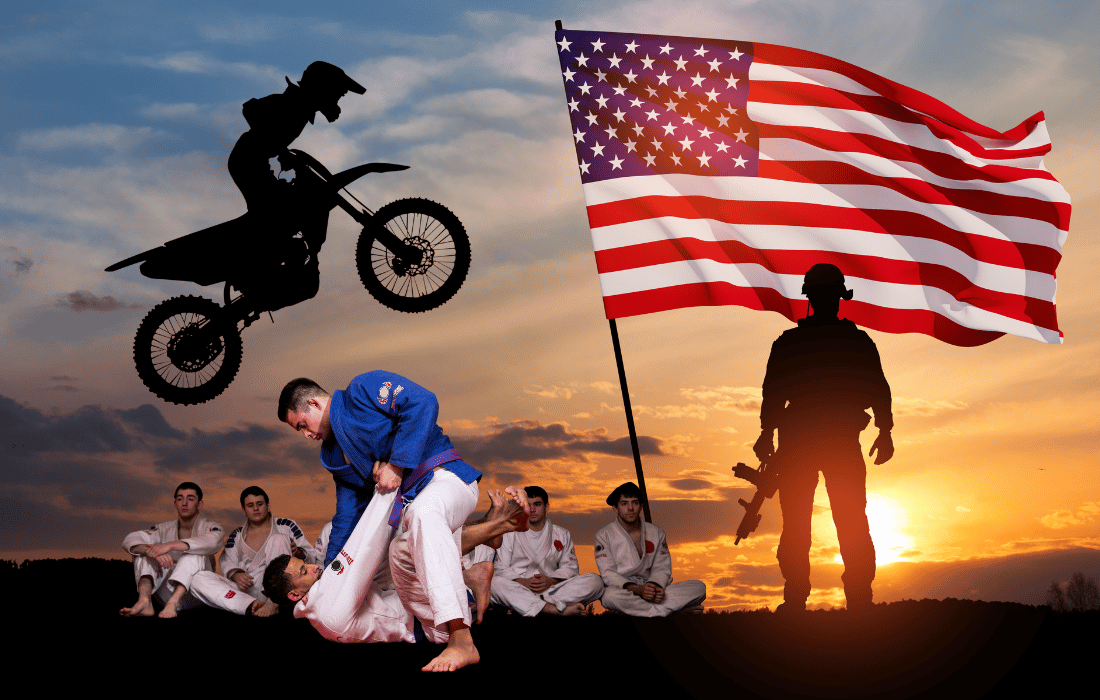Transitioning from the military to civilian life is a profound challenge for many combat veterans. The shift from a highly structured, mission-oriented environment to the often chaotic and uncertain world outside the military can lead to feelings of isolation, purposelessness, and even mental health struggles such as PTSD. For these veterans, finding a new outlet for their energy, discipline, and drive can be crucial for their well-being.
In recent years, a growing number of combat veterans have turned to action sports and martial arts as a means of coping with the stresses of civilian life. These activities offer more than just physical benefits; they provide a renewed sense of purpose, camaraderie, and mental clarity that can be difficult to find elsewhere. In this article, we’ll explore how these sports serve as powerful tools for veterans to navigate their post-service lives and why they are increasingly popular among those who have served.
The Healing Power of Action Sports
1. A Natural Fit for Thrill-Seekers
Combat veterans are no strangers to adrenaline. The intense experiences they endure in service often leave them seeking high-energy activities that can match the thrill of combat. Action sports like motocross, off-road racing, skydiving, and riverboarding offer the perfect outlet for these adrenaline seekers.
For instance, organizations like Warrior Built Foundation and VetMX specifically cater to veterans by providing opportunities to engage in high-octane activities. Warrior Built, for example, enters all-veteran teams into off-road motorsport races, such as the Score International Baja 1000, offering participants the chance to experience the teamwork and rush they once found in military operations.
Motocross, in particular, has proven to be a popular choice for veterans. The combination of speed, skill, and physicality required in motocross resonates with many who have served. VetMX taps into this thrill-seeking personality by leveraging the process of teaching motocross to arm veterans with physical and mental discipline—qualities that are essential for healing, recovery, and re-assimilation into civilian life.
2. Teamwork and Camaraderie
One of the aspects of military life that many veterans miss the most is the camaraderie that comes from working within a tight-knit unit. In the civilian world, finding the same level of trust and brotherhood can be difficult. Action sports, particularly those that require teamwork, can help fill this void.
Nick Hamm, a former Marine and the founder of Warrior Built, emphasizes the importance of teamwork in off-road racing, drawing parallels between military operations and racing. In both, success relies on the collective efforts of a team, whether it’s the driver, co-driver, or pit crew. This shared experience fosters a sense of belonging and purpose, helping veterans reconnect with the camaraderie they valued in the military.
3. A New Mission
For many veterans, finding a new mission or purpose is key to successfully transitioning to civilian life. Action sports offer a way to channel their skills, discipline, and energy into a constructive and fulfilling pursuit. Whether it’s mastering a new sport, competing in races, or mentoring other veterans, these activities provide a sense of achievement and direction.
The nonprofit XSports4Vets is an example of how extreme sports can offer veterans a new mission. By engaging in activities like rock climbing, skydiving, and rafting, veterans can redirect their excess energy in a positive direction, helping them cope with the stresses of civilian life. Each session ends with a group discussion, reinforcing the importance of reflection and shared experiences in the healing process.
The Mental and Physical Benefits of Martial Arts
1. Discipline and Focus
Martial arts, particularly Brazilian Jiu-Jitsu (BJJ), have become increasingly popular among combat veterans. The discipline, focus, and mental toughness required in martial arts resonate deeply with those who have served. Veterans are already accustomed to the structure and routine that martial arts demand, making it a natural fit for their post-service lives.
Brazilian Jiu-Jitsu (BJJ), for instance, is not just a physical workout; it’s a mental one as well. The strategic nature of BJJ—where technique and leverage often trump brute strength—requires practitioners to remain calm under pressure and think several moves ahead. For veterans, this mental exercise can be a way to maintain and even enhance the skills they developed during their military service.
2. Physical and Mental Health

The physical benefits of martial arts are well-documented. Regular practice can lead to improved cardiovascular health, increased strength, and better flexibility. For veterans, staying physically fit is often a priority, not just for health reasons, but as a way to maintain a connection to their military identity.
However, the mental health benefits of martial arts are equally important. Veterans who struggle with PTSD or anxiety often find relief through the meditative aspects of martial arts. The focus required during training can help quiet the mind and provide a temporary escape from intrusive thoughts. Moreover, the repetitive nature of drills and techniques can be therapeutic, offering a sense of control and mastery.
Organizations like the We Defy Foundation recognize the profound impact martial arts can have on veterans. The foundation provides scholarships for veterans to train in BJJ, offering them not just physical training, but also a supportive community that helps them overcome the challenges they face. With over 600 veterans currently enrolled, We Defy is making a significant difference in the lives of those who have served.
3. Camaraderie and Brotherhood
Just as with action sports, the camaraderie found in martial arts is a major draw for veterans. The close-knit community that develops in a martial arts gym can be reminiscent of the bonds formed in the military. Training partners push each other to improve, support each other during difficult times, and celebrate each other’s successes.
This sense of brotherhood is particularly strong in BJJ, where the intimate nature of grappling creates a unique connection between practitioners. Veterans often find that the relationships they build on the mats extend beyond the gym, providing a social support network that can be crucial for their mental health.
4. A Sense of Purpose and Achievement
For veterans who struggle to find their place in the civilian world, martial arts can offer a new sense of purpose. The structured nature of martial arts training provides clear goals and a path to improvement. Whether it’s earning a new belt, mastering a difficult technique, or competing in a tournament, the milestones in martial arts offer a sense of achievement that can be incredibly fulfilling.
The We Defy Foundation also emphasizes the importance of personal accountability, mental and physical development, and confidence—all qualities that are nurtured through martial arts. For veterans, these elements can help rebuild their sense of self-worth and provide a new direction in life.
Real-Life Stories of Veterans Finding Healing Through Sports
1. The Story of Nick Hamm and Warrior Built
Nick Hamm’s journey from Marine to founder of Warrior Built is a testament to the healing power of action sports. After 20 years of service, Hamm recognized the need for a space where veterans could come together, share their experiences, and find new purpose through vocational training and recreational therapy. Today, Warrior Built provides veterans with opportunities to engage in auto mechanics, off-road racing, and other adrenaline-fueled activities, helping them reconnect with their sense of camaraderie and mission.
2. Brazilian Jiu-Jitsu and the We Defy Foundation
The We Defy Foundation’s impact on veterans like John (not his real name), who struggled with PTSD after multiple deployments, highlights the transformative power of martial arts. Through BJJ, John found a way to manage his symptoms, build new relationships, and regain a sense of control over his life. The foundation’s commitment to providing veterans with access to martial arts training has helped countless individuals like John find a path to healing.
3. The Role of VetMX in Veteran Recovery
VetMX offers veterans a unique opportunity to engage in motocross as a means of recovery and re-assimilation. By tapping into the thrill-seeking nature that many veterans possess, VetMX provides a structured environment where veterans can learn new skills, build physical and mental discipline, and reconnect with a community of like-minded individuals. For veterans like Keith, who described the brotherhood at VetMX as “very much alive and present,” the organization has been a lifeline in the transition to civilian life.
Why Action Sports and Martial Arts Are Ideal for Veterans
1. Harnessing the Adrenaline
Combat veterans are wired to handle high-stress, high-adrenaline situations. Action sports and martial arts provide a constructive outlet for this energy, allowing veterans to continue challenging themselves in ways that are both exhilarating and therapeutic. The physical demands of these activities also help veterans maintain their fitness levels, which is important for both their physical and mental health.
2. Rebuilding Camaraderie

The sense of brotherhood and teamwork that is central to both action sports and martial arts can help veterans rebuild the social connections that are often lost after leaving the military. These activities provide a sense of belonging and mutual support, helping veterans feel less isolated and more connected to others who understand their experiences.
3. Offering a New Mission
For many veterans, the transition to civilian life can feel like a loss of purpose. Action sports and martial arts offer a new mission—whether it’s mastering a new skill, competing in a race, or simply improving day by day. This sense of purpose is crucial for maintaining motivation and mental well-being.
4. Providing Mental Clarity
The focus and discipline required in both action sports and martial arts can help veterans clear their minds and manage stress. The physical exertion involved in these activities also releases endorphins, which can improve mood and reduce anxiety. For veterans struggling with PTSD or other mental health issues, these benefits can be life-changing.
Conclusion
Combat veterans face unique challenges when transitioning to civilian life, but action sports and martial arts offer powerful tools to help them navigate this difficult journey. These activities provide not just physical benefits, but also mental clarity, camaraderie, and a renewed sense of purpose. By engaging in sports like motocross, off-road racing, skydiving, and Brazilian Jiu-Jitsu, veterans can find healing, community, and a path forward.
Organizations like Warrior Built, VetMX, XSports4Vets, and the We Defy Foundation are leading the way in providing veterans with opportunities to engage in these activities. Their work is a testament to the transformative power of sports in the lives of those who have served.
For combat veterans looking for a way to reconnect with their sense of purpose and find new meaning in civilian life, action sports and martial arts offer a path worth exploring. Whether it’s the thrill of racing or the discipline of martial arts, these activities can help veterans reclaim their lives and move forward with strength and resilience.







